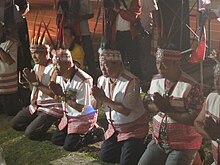Taokas people
This article needs additional citations for verification. (February 2023) |
Taokan, Taokas | |
|---|---|
 Taokas men on the annual ceremony Khantian. | |
| Regions with significant populations | |
| Hsinchu, Miaoli, and Nantou in Taiwan | |
| Languages | |
| Taokas, Taiwanese, Mandarin | |
| Religion | |
| Animism, Taoism, Buddhism, Christianity | |
| Related ethnic groups | |
| Babuza, Saisiyat |
| Taiwanese indigenous peoples |
|---|
 |
| Peoples |
|
Nationally Recognized Locally recognized Unrecognized |
| Related topics |
Taokas (Chinese: 道卡斯族; pinyin: Dàokǎsīzú) is one of a number of Indigenous ethno-linguistic groups that inhabited the plains of western Taiwan.[1] The Taokas were located in the areas around today's Hsinchu City/Hsinchu County, Miaoli County, and Taichung City region.[2] Several Taokas groups have been historically linked to many revolts that plagued Taiwan during the Qing era (1683–1895). The Taokas were not always opposed to Han encroachment on their lands as several Taokas groups were involved in building the Ta-Chia Mazu Temple. Today, only a small number of people in the central city of Puli identify themselves as ethnic Taokas or even Taiwanese Aborigines. The Taokas people have a long history of fishing and preserving their traditions and beliefs, including the worship of sea gods and the performance of traditional dances and music.[3]
See also
References
- ^ "Awakening ancestral memories - Taipei Times". www.taipeitimes.com. 2018-09-26. Retrieved 2023-02-01.
- ^ Knapp, Ronald G. (ed.). "China's Island Frontier, Studies in the Historical Geography of Taiwan" (PDF). The University Press of Hawaii and The Research Corporation of the University of Hawaii.
- ^ "Taiwan island tribe clings to seafaring traditions". Reuters. 2007-05-23. Retrieved 2023-02-01.
